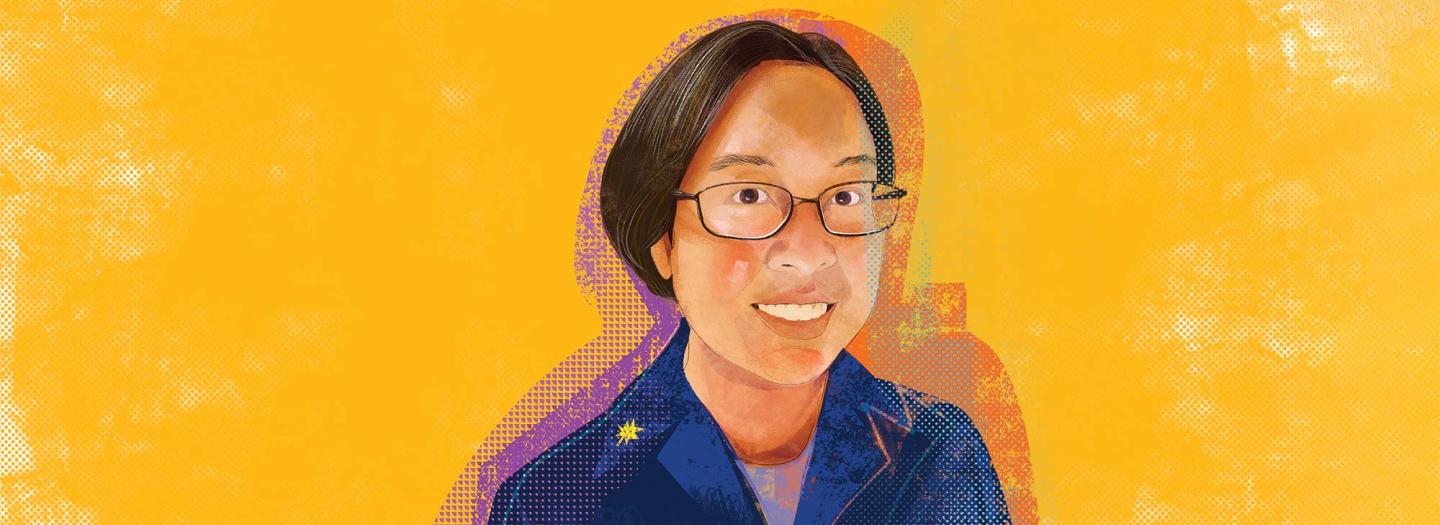Madalene Mandap, PharmD ’12 : Hand in hand with Alaska Native people on the journey toward health
A “help each other” mindset drew Madalene Mandap to Anchorage and the Southcentral Foundation.

The voice on the other end of the phone was urgent. A patient at Southcentral Foundation in Anchorage was starting transition treatment and needed lessons in hormone injections.
As the organization’s pharmacy expert on gender-affirming care, Madalene Mandap, PharmD ’12, was needed STAT. “We don’t do it a lot,” she explains, referring to transitioning treatment in the 49th state. “It’s still fairly new here.”
So Mandap raced to the clinic to explain injection protocol to a person about to embark on a new life. It’s not unusual for the veteran pharmacist to guide patients taking significant steps. Another decided to begin treatment for hepatitis C, though still a heroin user. Mandap discussed options for addiction treatment and ensured the person left with naloxone nasal spray in case of overdose.
“My job is never boring,” she says. “We’re not just sitting there, plugging and chugging prescriptions. If there’s a way to improve health, we can find it.”
Southcentral Foundation, where Mandap has worked since 2013, after finishing her residency, is well known in the health care world. The recipient of two prestigious Malcolm Baldrige National Quality Awards, Southcentral is a sprawling system of clinics that serves 65,000 Alaska Native and American Indian people. Thanks to the Baldrige awards, the highest honor in U.S. health care, the foundation hosts experts from all over seeking to understand its success in treating Indigenous populations.
A chief reason is respect for those it serves. Since 1999, Southcentral has practiced a care model called Nuka – a relationship-based approach that aims to improve outcomes and reduce costs. The respect for patients – called “customer-owners” in Southcental’s parlance – is what attracted Mandap to Anchorage.
Her recent gender-affirming interaction was a case in point. Already working with a therapist, the patient was ready to start the physical process and needed guidance. “It was a co-visit,” Mandap recalls, “so the primary care provider was there, as well as the nurse case manager. It was awesome, all of us being in the room together, each with our own specialty.” In one fell swoop, the team handled education, injection training, behavioral health support, and paperwork.
“We went from identifying a person who says, ‘I want to start hormone therapy,’ to my dispensing the medication within a week. We were able to get in and out and answer all questions. Whew!” she concludes.
The anecdote illustrates why Mandap, a Navy brat who grew up in Barstow, Calif., decided to serve her residency in a place she’d never visited, 3,500 miles from home and her close Filipino family. She explains that not only was she drawn to the organization’s mission, but Alaska also wooed her from the start when she stopped in at a bar featuring live music.
“I found that you get pulled into a family, almost like it’s a chosen family,” she says. “You show up as a stranger and quickly get interconnected and taken care of. Then you want to take care of others around you because up here, the weather, the snow, the ice can strand people,” she notes about the state that is now home for Mandap and her wife, Ariel Berg, whom she married in September. “It’s all about safety, so people fall into this ‘help each other’ mindset.”
Southcentral Foundation exemplifies that mindset. The federal Indian Health Service provided health care for Alaska Native people until the early 1980s, when the tribes took control. Now health care is tribally owned and operated – an arrangement Mandap describes as empowering to both participate in and witness.
“From my time at UCSF, what really spoke to me, what really lit my fire, was serving the underserved. Part of it is personal experience,” she says. “I’m Filipino American. My parents immigrated here after my dad joined the Navy, so I’ve seen health disparities – like language barriers – that result in people getting inferior care.”
That philosophy also explains her decision to join the Commissioned Corps of the U.S. Public Health Service (PHS). As the nation’s front-line public health force, the PHS can send officers on a moment’s notice to health emergencies. In 2019, Mandap was deployed to Texas to provide care for people who’d lined up the night before to obtain free dental care and eye exams and to have their glucose levels checked. The assignment was right up her alley.
“There’s something to be said for wearing the uniform. We’re serving our country. We’re at the ready to be deployed,” she says. “Now, I am in service of Alaska Native and American Indian people to improve their health care, with their help. It’s a passion of mine to find those gaps and stand in them to do what I can to help.”
– Katherine Conrad for UCSF Magazine
Read the Winter 2022 Issue